Hi Everyone,
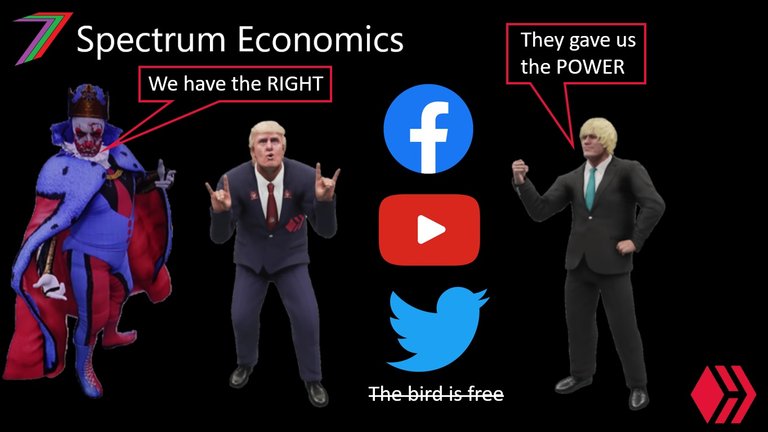
Who has the right to censor? Who has the power to censor? Before we can answer these questions we need to understand what is meant by censorship. Below are definitions of ‘censorship’ taken from the Cambridge and the MacMillan Dictionaries.
Definitions of Censorship
Censorship is the action of preventing part or the whole of a book, movie, work of art, document, or other kind of communication from being seen or made available to the public, because it is considered to be offensive or harmful, or because it contains information that someone wishes to keep secret, often for political reasons (Cambridge Dictionary).
Censorship is the process of removing parts of books, movies, letters, etc. that are considered inappropriate for moral, religious, or political reasons (Macmillan Dictionary).
Censorship is an act of blocking information. It could be done with good intentions or it could be done with bad intentions.
In this post, I want to discuss the act of censoring and what enables people and organisations to censor others. As the topic of censorship is broad. In this post, I focus on censorship in relation to Governments and social media companies. Many of the concepts discussed in this post are relevant to censorship in other settings such as the workplace and home.
Does ownership grant the power to censor?
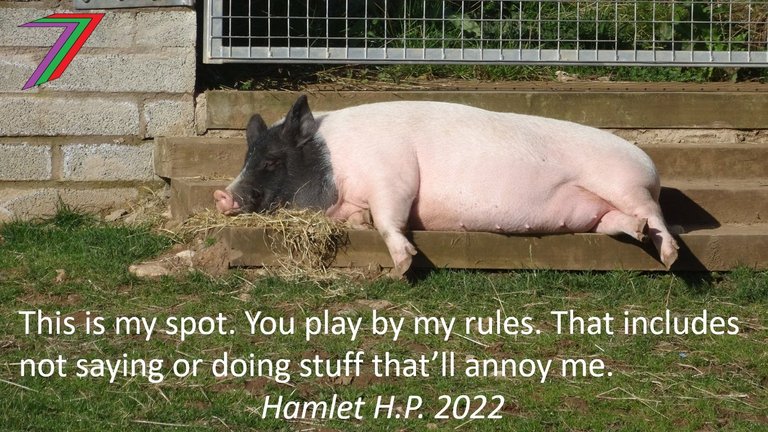
I believe ownership is central to enabling the censorship of people and information. According to the free dictionary and Merriam-Webster dictionary, ownership equates to possession and control of property. In my post ‘The Power to Own’, I argued that control, though the lesser discussed aspect of ownership, is most critical. Control enables people to take and hold possession of property as well as enables people to use their property as they please.
Ownership also enables censorship. This is because the owners can restrict how their property is used. For example, the owner of a house controls what happens in the house, what is permitted in the house and who can enter or stay in the house.
In the absence of ownership, censorship cannot exist as nobody has control over the property. However, this is almost never the case. Almost everything and everywhere accessible to people is claimed to be owned by someone. This is either direct private ownership or public ownership. Therefore, censorship can occur almost anywhere if that is the will of the owners.
When ownership is shared, so is control. Individuals have less control over how the property is used. Arrangements or agreements (formal or informal) are made between the owners. These agreements determine the usage of the property. As ownership becomes more dilute, we should expect censorship to become less likely as more owners need to consent to it. However, owners often delegate decision-making to a smaller group of people. For example, shareholders delegate decision-making to a few company executives. The smaller group of people can more easily come up with rules that employees, customers, users, etc. are required to follow. This will likely led to some form of censorship. This detaches shareholders from control; thus, in practice, temporarily transfers the power of ownership to the executives.
Do Governments have the right to censor?
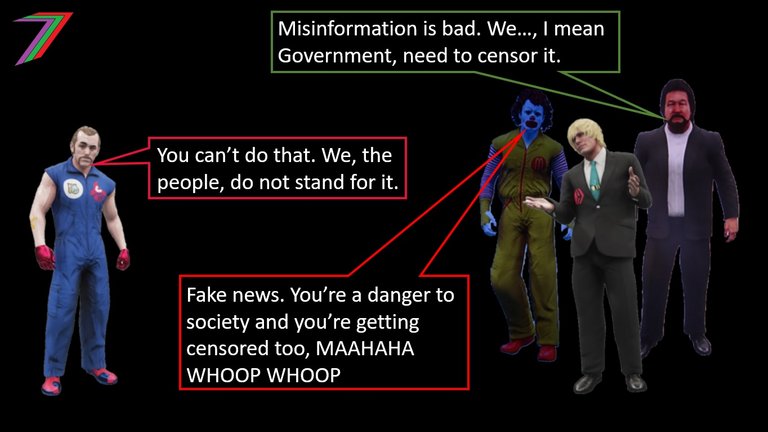
For the purpose of this post, I consider Government in context of direct ownership of resources (i.e. most direct control). As discussed in the previous section, ownership creates the opportunity to censor information, ideas, behaviour, and even people. Some Governments and the people running them have significant ownership of resources. While other Governments do not directly own resources; they act on behalf of the people who own or have claim to these resources.
We can link Governments’ direct ownership of resources to level of democracy defined by western standards. For the purpose of this post, I will base level of democracy on Economist Intelligence Unit’s (EIU) measures and definitions. Based on their standards, we assume democracy and Governments’ direct ownership of resources are inversely related (i.e. democracy increases, Governments’ direct ownership of resources decreases).
There appears to be a relationship between western style of representative electoral democracy and liberalism (open to new opinions and behaviours). According to World Population Review, the 10 most liberal countries are:
- Norway
- Sweden
- Denmark
- Finland
- Iceland
- New Zealand
- Switzerland
- Canada
- Germany
- Austria
According to the EIU, on a list of 167 countries, all ten of these countries rank in the top 20 most democratic countries in the world. All of them met the EIU’s standard to be categorised as full democracies.
There appears to be an inverse relationship between western style of representative electoral democracy and conservatism (supports existing traditions and practices). According to World Population Review, the 10 most conservative countries are:
- Yemen
- Mali
- Iran
- Pakistan
- Chad
- Egypt
- Saudi Arabia
- Lebanon
- Eswatini
- Ethiopia
According to the EIU, all ten of these countries ranked outside the top 100 most democratic countries in the world. Nine of them were categorised as authoritarian and one of them (Pakistan) was categorised as having hybrid regimes.
Governments with Direct Ownership
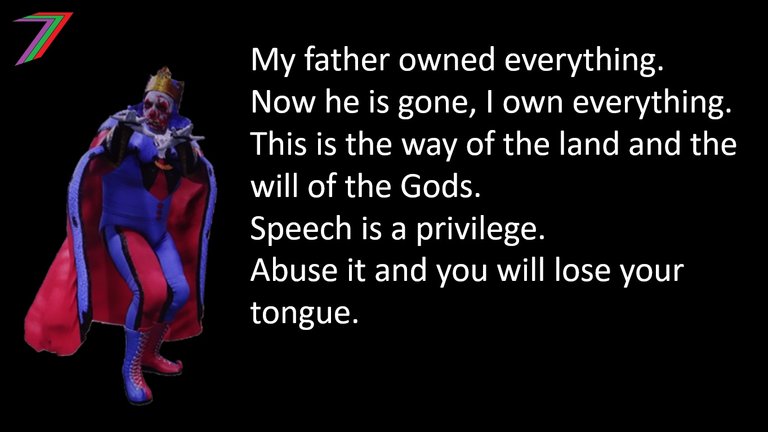
Governments and leaders of Governments that have direct claim to ownership of much of the countries resources (e.g. monarchies, dictatorships, and oligarchies) are directly enabled to be authoritarian. They determine how the country’s assets are used and who benefits from their usage. The direct control enables them to censor information, behaviour and people with ease. Censorship can be used as a tool to prevent the spread of opposing ideology or criticism of leadership. Censorship could also be accompanied with propaganda, which would be used to promote the superiority of existing leaders and their regime. In the absence of alternative views, propaganda would appear more convincing. Good strategic use of censorship could secure and even strengthen these regimes control over society.
There is a limit to the extent that than any regime can impose itself on its people. If they act in a manner that people find strongly objectionable (e.g. change, control and dictate culture), they face a higher chance of resistance. This resistance could lead to the fall of the Government as well as the assets held by the leaders of Government. Therefore, Government need to act within the limits that its people broadly consider tolerable. The level of tolerance could vary considerably between countries.
As demonstrated earlier in the post, many of the people in these countries are conservative. Culture and tradition plays an important role in these countries. Leaders can strengthen their position by strongly supporting the country’s established culture (Karen Stenner 2009). It is possible censorship would not be considered important as people would voluntarily reject alternative opinions and views as they consider their own culture as tested tradition. They may favour continuity over change. Alternative ideology may not be a significant threat.
Governments without Direct Ownership
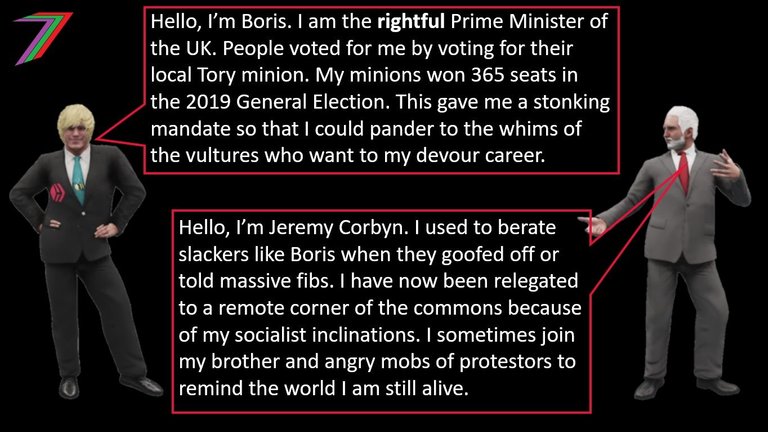
Most leaders of western Governments do have not ownership of their country’s resources. They act on behalf of the people who determine who leads and runs the Government. These systems are referred to as representative democracies. The process for determining the people who run and lead Governments varies between different countries. Parliamentary systems and presidential systems are popular systems used to determine leaders.
Typically, in a parliamentary system, people are provided the opportunity to vote for candidate/s running for political office in their constituencies. These candidates are intended to represent the people of their constituency in parliament. Many candidates also represent parties. These candidates have essentially pledged their support for their current party leader. Therefore, during a general election, voting for a candidate from a particular party is an indication of endorsement of the party leader. Party leaders are selected by the party members. If the party is able to form Government, the party leader becomes head of Government and normally appoints the most senior leaders within the Government’s cabinet. Party leaders have influence over which party members run for office as well as which constituency they run in.
Typically, in a presidential system, people vote for candidates running to become Head of Government. This could involve voting directly for a candidate or for electors (US system) that have pledged support for a particular candidate. Presidential candidates often belong to a party. The party can determine, which person will become the presidential candidate representing their interests. Parties in presidential systems do not necessarily need to have a party leader.
As part of election campaigns, political parties or candidates have election manifestos. These manifestos outline the party’s key objectives and commitments for their term in office if they become elected. When people vote for a candidate, they are also expressing support and consent for the proposed manifesto.
Some countries have constitutions that have been setup to protect their citizens from potential abuse from their Governments. For example, the US constitution protects the liberties of its citizens. One such liberty is freedom of speech. This limits the Federal Government’s authority to censor information, ideas, behaviour, and people.
If we had a functioning Democracy based on proclaimed western standards
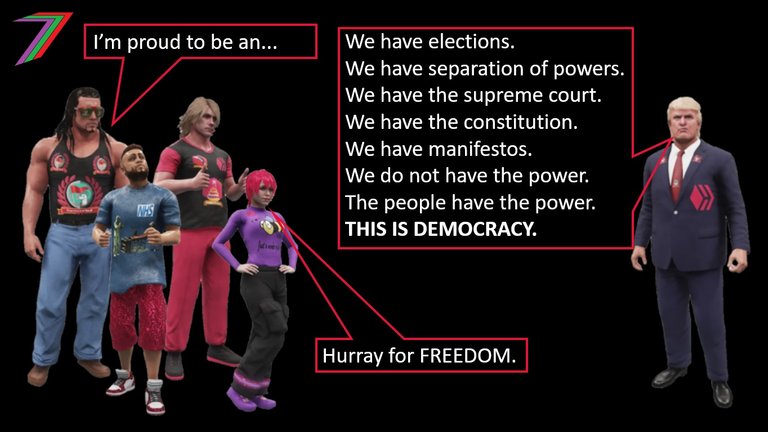
If we assume the above described political systems operate to facilitate a functioning democracy, leaders in Government are accountable to the voters, their powers are restricted by their constitution, and they are obliged to follow their election manifesto. Therefore, the voters have strongest claim to ownership to resources directly controlled by the Government. Once elected, leaders of Government make decisions and policies that align with their campaign commitments and are compliant to the country’s constitution. Opposition parties serve the role of holding Government accountable for their actions through questioning and debate. Media acts as an additional layer of scrutiny of Government actions as well as a conduit for explaining what decisions have been made and why they have been made.
A functioning democracy would have a clear separation of powers between various areas of responsibility. Typically, these areas are the executive branch (e.g. Head of Government and ministers), legislative branch (e.g. Parliament, which normally includes two separate chambers), and judiciary branch (e.g. courts and enforcement). This is done to prevent any group of elected officials from gaining overarching control of the country (read my post Political Systems and Freedom for a more detail explanation).
In a functioning democracy, censorship should only be possible if it aligns with commitments made to the voters and does not violate existing laws or the country’s constitution. Attempts at censorship that does not meet that criteria would be met with sufficient opposition to ensure that it does not happen.
Reality of western style representative democracy
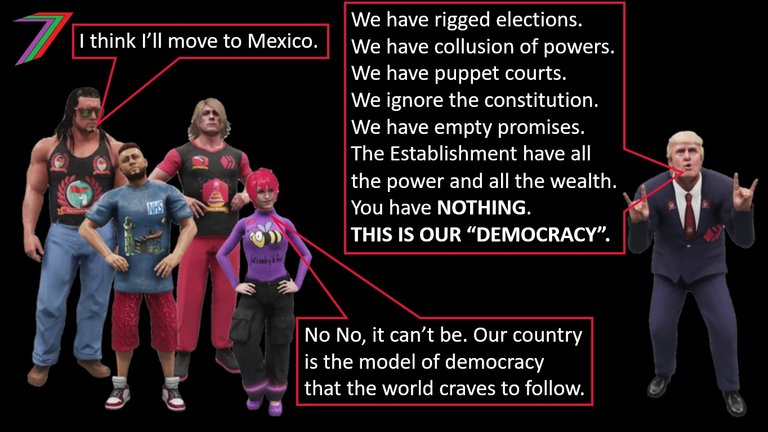
Despite these sophisticated political systems and the apparent restrictions on Government leaders’ power, the voters do not have control over how their country is governed. They do not have control, direct or indirect, over Government resources. In my post ‘The Power to Own’, I discuss ownership in general and how it links back to the Establishment (Government, Big Business, Banks, Media (mainstream and social media), Religion). There appears to be a power sharing structure amongst various areas in the Establishment. Therefore, claim to ownership of anything of value is also shared; this includes public resources, assets, and businesses (read my post The Establishment for a more detail explanation).
The Establishment have the ability to censor as they can control information through mainstream media. Any information that contradicts the information spread by mainstream media is labelled as dangerous. It could be labelled as misinformation or hate speech. The mainstream media will report stories of how people have harmed themselves or other people. They will claim this occurred because of this alternative information. The proposed solution is censorship as a way of protecting people especially children. Most members of parliament will endorse the mainstream media’s narrative and push censorship on the pretence it is in the public interest and has public support. The same approach is used to push through any legislation that reduces people’s freedom. Politicians who speak out against the narrative will not have successful political careers or are acting as controlled opposition.
Verdict
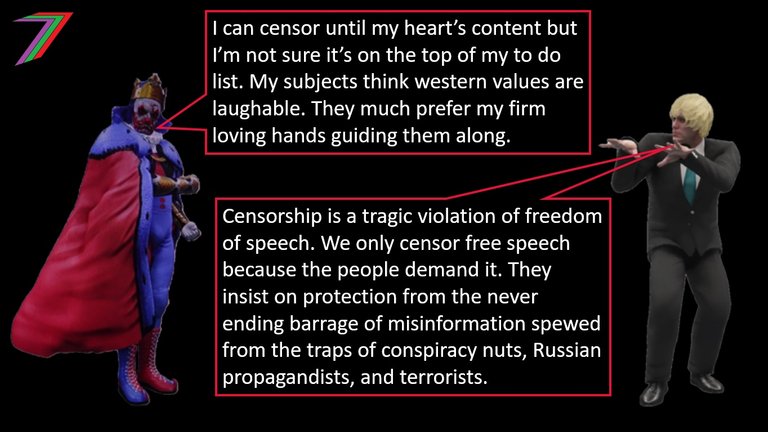
Governments that have direct control of much of the country’s resources and assets can control the people directly and can censor information, opinions, behaviour and people with relative ease. Some Governments might feel censorship is a necessity to maintain power and prevent people from rebelling. Other Governments might consider censorship as less necessary as the people are conservative. They strongly believe in their culture, traditions, and religion.
Without consent from the people they represent, Governments that do not have direct control of the country’s resources and assets have limited ability to censor information, opinions, behaviour and people . In a functioning democracy, they require the consent of the people who voted them into Government. Functioning democracy is a myth and not reality. Instead, leaders in Government require consent or are even directly told by people in the Establishment who have considerable influence over the success of politicians’ careers. Therefore, censorship is not difficult to achieve. The desire to censor, will be considerably strong. This is because of the level of deceit that is taking place in Government and throughout the Establishment. Censorship combined with propaganda is used to prevent a sufficient number of people realising that they have little to no power to influence decisions in the current systems.
Having direct control over resources is much easier to establish than the sophisticated network of control that I describe as being used by western Governments. Therefore, why do they bother going to such effort when they could be directly authoritarian? This is because of the nature and attitudes of the people in these countries.
Western countries, as shown early in this post, are predominately liberal (supposed western conservativism is only relative in the context of the western liberal paradigm; therefore, it is a form of neo-conservatism). People are open to new ideas and ways of doing things. They are not content to accept something because that is the way it has always been done. They are not willing to be controlled directly and strongly desire a say in how they are governed and who governs them. Directly authoritarian regimes in western countries have failed in the past. The next best alternative is to create the illusion that people rule themselves and that their leaders come from amongst them.
Do social media platforms have the right to censor?
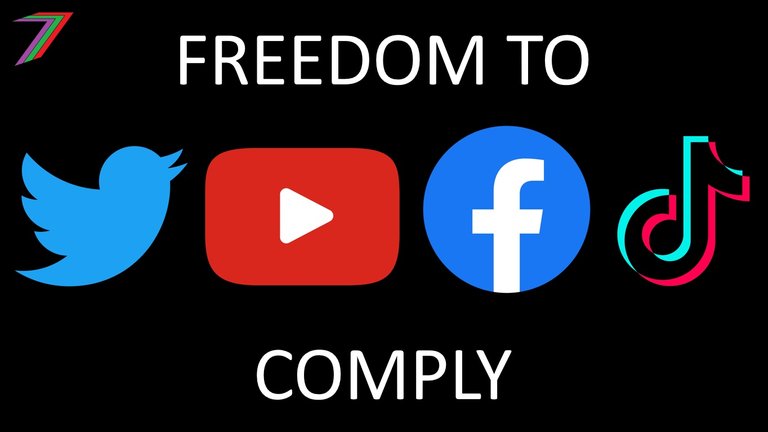
Let us assume the owners of social media platforms have full control over the content on their platforms. Simply having ownership gives them this control. They can remove any content they want for any reason. They do not even need to state this reason. However, if the social media platform flagrantly removes content on a whim, their users are going to switch to an alternative social media platform. Hence, ad hoc censoring is harmful to the platform.
To protect themselves and their reputation, social media platforms require a defensible approach to censorship. They can do this by publishing terms of service. Their terms of service generally states what content or behaviour they consider unacceptable. The contents of the terms of service could contain anything. If a person’s content does not meet the requirements of the terms of service, the social media platform can legitimately censor this content. For example, the terms of service may forbid the posting of photographs of kittens. If a person posts a photograph of kittens, the social media platform can remove the photograph and are able to justify doing so. It is difficult for users to justify complaints because it is stated in the terms of service. Social media platforms are likely to make their terms of service a little vague so that they do not scare away too many users and are able to censor content with use of some discretion.
Social media platforms have the power to censor content and users but why would they need to do so? Social media platforms are businesses and run with the intention of profiting from its users. Therefore, there should only be a desire to censor content and users, if it results in increased usage of the platform or is an avenue to higher profits that might not be available in the absence of censorship.
As discussed in my post ‘The Power to Own’, true ownership is not straightforward. Owners of social media are subject to external pressure. Governments can use social media for political gain. Big business can profit from advertising, mainstream media can benefit from extended reach for their content. Social media platforms can benefit from content provided by prominent political figures, media stories and updates, the entertainment industry and celebrities. This content attracts many users. If prominent users limit themselves to using just a few social media platforms, these platforms will capture the majority of the social media market; thus gain monopoly power. Big business will respond to such a massive market by advertising more frequently and by paying more money to the social media platform; thus, generating enormous revenue. However, Government, big business, mainstream media, and the entertainment industry are likely to want the social media platform to cave to certain demands. One of these demands is likely to be censorship. As mentioned in the section about Government, censorship is desirable as it prevents the flow of information that is a potential threat to the Establishment’s interests.
Without the Establishment’s support, social media platforms are likely to struggle as they will have a difficult time attracting prominent, established, and famous users. Some well-known users who oppose the Establishment and have been censored on major social media will be attracted to social media that does not censor them.
Some of these social media platforms will become the controlled opposition. These social media platforms will claim to oppose censorship; they will support this claim by not censoring many of previously censored users. However, these social media platforms will have the same capability to sensor users as the major social media companies. Controlled opposition also needs control over content. In the social media space, controlled opposition has been limited. Even people that have been frequently censored still use the major social media platforms. Elon Musk’s acquisition of Twitter, has potentially created a strong controlled opposition to other major social media companies and weakens the market niche that other social media platforms may have partly established.
Enter Web3.0 Social Media
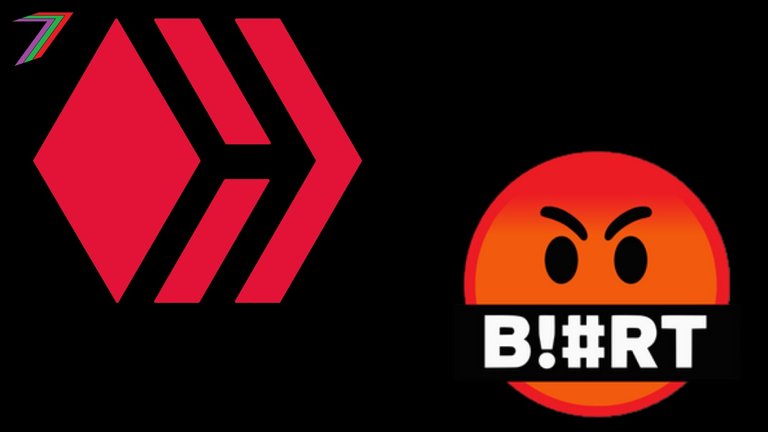
Web3.0 social media platforms such as Hive and Blurt offer resistance to censorship because they enable the storage of content on blockchains. This resistance is enhanced through decentralisation of stake in the blockchain. Decentralised blockchains can almost entirely protect written content. However, the owners of applications on the blockchain can censor content that appears on their application (e.g. Steemit censors content and users from the Steem blockchain). This does not prevent any other application or even website from still displaying that content. Photographs, videos, and audios can be more easily censored as they are stored off-chain. It is possible that future upgrades to blockchains can enable censorship resistant storage for these types of content.
If Web3.0 social media platforms attract sufficient numbers of people, they will become a viable competitor to major social media platforms. An attractive feature for many will be the ability to earn tokens from activity (e.g. writing blogs, posting videos, playing games, developing apps and projects, supporting other people’s content and even socialising). Through this mechanism, the users become stakeholders in the blockchain. Tokens might be newly created, contributed by other users, or from an external stream of revenue.
Existing major social media platforms do not reward its users to the same extent (e.g. YouTube shares a small amount of advertising revenue with users who have a large following). Some social media platforms even charge users to post content or use certain features (e.g. Twitter may soon begin charging people to be verified (blue tick) and YouTube requires users to pay to view certain content).
If the Establishment strongly opposes the growth of Web3.0 social media, is it possible for them to grow to the size of the current social media giants (Facebook, Twitter, YouTube, and TickTock)? Could the Establishment push their own centralised imitation/s version of Web3.0 social media? The answers to these questions depend on how strongly people support freedom of speech and oppose censorship.
My Personal Beliefs
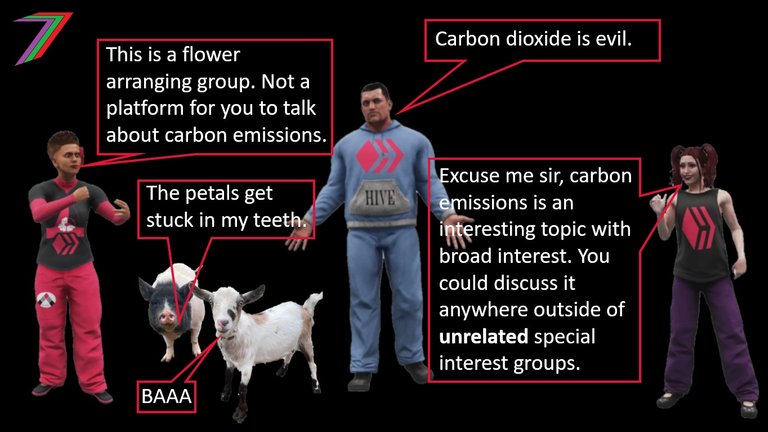
I am strongly opposed to censorship. I believe people should be free to express their opinions. I do not believe misinformation should be broadly censored. I do not believe even hate speech should be broadly censored.
Misinformation that is openly available can be challenged and openly disproven. Misinformation that is censored is restricted to small groups and left mostly unchallenged. These small groups can grow as the misinformation is spread through people’s personal networks and most likely will face minimal resistance and debate. Most people do not support hate speech. If it is openly exposed, it will be rejected by the community. If it is not openly exposed it could fester into something worse. Censorship blocks transparency and therefore prevents accountability.
There is also the problem of defining what counts as misinformation or hate speech. Information is often contested, what might initially appear as false could be true upon further investigation. Accurate information could be accidentally or deliberately censored. Actual misinformation could be considered as accurate information for prolonged periods because it was not challenged by accurate information that was incorrectly censored.
Hate speech is difficult to clearly define. Any form of communication has the potential to offend people. How much offense does it need to cause for it to be considered hateful. It is very subjective. If a persons is offended by another person they can choose to ignore them. If it occurs on social media they could choose to block them. Small groups of people could arguably take the same action without the offending message or person being broadly censored from the entire platform.
I also believe in freedom. Censorship directly blocks the flow of information. Therefore, censorship restricts freedom. However, preventing censorship also reduces freedom. What is a greater impingement on freedom, preventing censorship or allowing censorship? This is likely to depend on context. Censorship that broadly removes a person’s freedom to express themselves is a greater impingement on freedom than the prevention of censorship. Censorship within small groups only removes a person’s freedom to express themselves within the group. This type of censorship protects the interests and possibly freedom of the members of the group. For example, sharing pornographic material at a wedding. The person censored from the group can express themselves somewhere where his/her content does not inflict harm on the group.
More posts

If you want to read any of my other posts, you can click on the links below. These links will lead you to posts containing my collection of works. These 'Collection of Works' posts have been updated to contain links to the Hive versions of my posts.
Hive: Future of Social Media
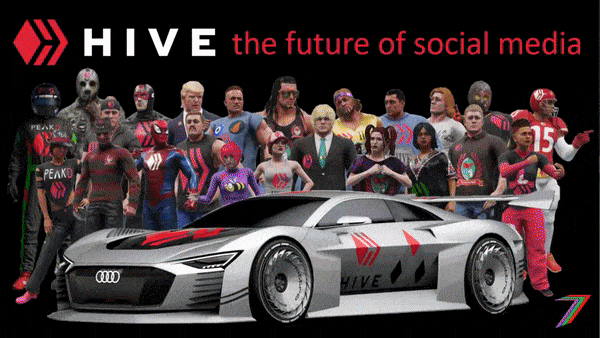
Spectrumecons on the Hive blockchain





So many words😵
I think censorship by the government shouldn't be done though.
Channels that broadcast the news should be free from external and governmental entanglements as that is what would guarantee their freedom.
Although me wanting this is just wishful thinking 😂😂
You are right, it is a little long. I needed the context to deliver my points. I guess I could have divided it into 2 or 3 parts. Two on Government and one on social media. I plan on writing shorter posts eventually.
As long as there is Government, there will be censorship. Shrinking Government can reduce it. I prefer Government to be replaced with an admin body that does not make big decisions but instead focuses around implementation.
Government would always be government 😅
Thought I think the censorship just depends on the particular government (bad government). If there's nothing to hide, I don't see the need for censorship of the press.
@tipu curate
Upvoted 👌 (Mana: 14/44) Liquid rewards.
Thank you 👍